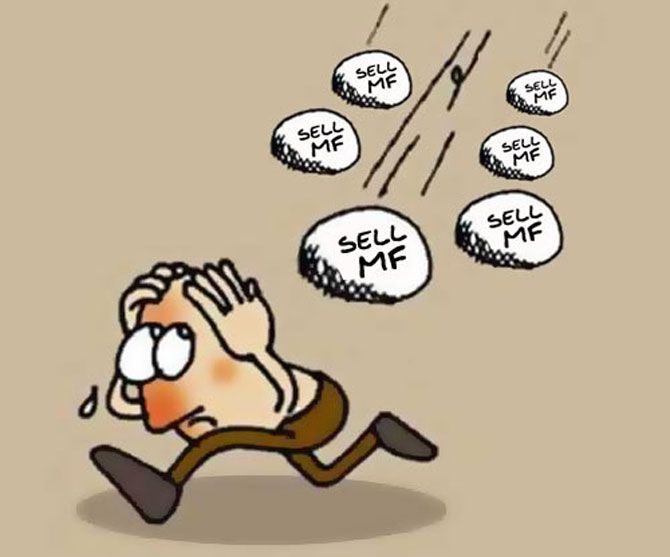'One reason why value funds have done poorly is that the Securities and Exchange Board of India's (Sebi's) recategorisation circular only says that the fund should follow a value investment strategy, with a minimum 65 per cent in equity and equity-related instruments but does not impose market cap-related limits,' says Sanjay Kumar Singh.
Illustration: Uttam Ghosh/Rediff.com

Value funds have given a category average return of minus 11.53 per cent over the past year.
Only the mid-cap and the small-cap categories have fared worse.
When investors put their money in value funds, they expect them to protect their portfolios against the downside risk in declining markets, which many have clearly failed to do so.
One reason why value funds have done poorly is that the Securities and Exchange Board of India's (Sebi's) recategorisation circular only says that the fund should follow a value investment strategy, with a minimum 65 per cent in equity and equity-related instruments.
It does not impose market cap-related limits.
"Many value funds have high exposure to mid- and small-cap stocks.
"The performance of these stocks has diverged widely from that of large-caps, which accounts for the divergence in performance within the value category," says Meenakshi Dawar, fund manager, Reliance Nippon Life Asset Management, which manages Reliance Value Fund.

Another reason why most categories of active funds, and not just value funds, have fared poorly has been the concentrated nature of market performance.
"Over the past 18 months, returns have been concentrated in the top few stocks within the Nifty.
"These stocks have been trading at premium valuations.
"Since many value funds try to maintain an average portfolio valuation that is lower than that of their benchmark, they had lower exposure to these stocks," says Amit Kumar Premchandani, senior vice-president and fund manager, UTI Mutual Fund.
Due to the need to diversify their portfolios, most fund managers hold 45-70 stocks, with 0.5-10 per cent allocation to each stock.
Investors also need to check if their funds have been true to their style mandate.
Sebi's recategorisation initiative made it mandatory for fund houses to have just one fund in each category.
"Many fund houses that did not have a value fund simply shifted a fund from another category to this one.
"But the way these funds are managed may not have changed," says Nilesh Shetty, co-fund manager, Quantum Long-Term Equity Value Fund.
Investors should, however, not completely give up on value funds.
"When the economic and earnings cycle revives, value funds, which hold low-valuation stocks, will do well," says Premchandani.
Dawar, in fact, says this is a good time to tilt one's portfolio towards value funds.
"The valuation differential between the growth and the value category has increased.
"But when there is a pickup in earnings growth, that premium will return towards the median level.
"Value stocks will then outperform," adds Dawar.
Investors should build a style diversification within their portfolios.
Kaustubh Belapurkar, director-manager research, Morningstar Investment Adviser India, suggests that investors should make sure the mid- and small-cap orientation of your value fund does not make the portfolio too heavily skewed in favour of these market caps.













 © 2025
© 2025